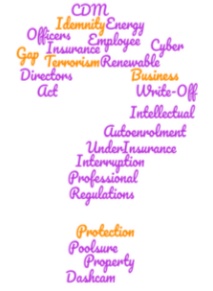
Expecting the unexpected probably comes with life experience but even after the pandemic, this time last year few thought Putin would really be mad enough to invade Ukraine and start a ‘full-scale’ war.
Nearly one year on we are still feeling the effects, particularly with gas and fuel, although with wholesale gas and oil prices now lower than pre-invasion levels, the invasion seems to have conveniently hidden, at least in part, the effect of the government’s lockdown policies. Inflation was already a problem before Putin made it worse.
On the insurance front, Insurers reacted to the invasion in their tried and trusted way when faced with a global risk that can break or seriously dent their balance sheets. They generally excluded all war cover in the area, although this had little or no effect to most UK businesses as other than marine and aviation, insurance policies generally exclude war risks. Following assessment, cover became available for certain ‘safer’ areas of Ukraine subject to prior notification. There was also the question of government sanctions preventing insurance cover being provided on virtually all assets owned or in use in the Russian area.
Prior to the invasion few of us knew of our reliance on Ukraine for many basic food stuffs and essential commodities, and the potential loss of the Ukraine grain harvest hit the headlines when it was deemed a possible humanitarian crisis. Part of the problem was arranging insurance for the shipments from Ukraine and Lloyds stepped in to provide up to $50m cover for the grain to be shipped through the UN negotiated Black Sea corridor.
The other big talking point in insurance circles has been the claims in the aircraft leasing sector.
Sanctions prohibiting any insurance on assets owned by Russian entities or in use in Russia were imposed two days after the 24 February invasion and required leases with Russian airlines to be terminated by 28 March. With Russian companies having over 500 aircraft with an estimated value of $10 Billion leased from Western Countries Putin got in first and on 14 March put into law that the aircraft were Russian and could be used internally.
As war risks include confiscation or seizure by the order of government, many leasing companies have submitted claims for either theft or confiscation but insurers are refusing to pay, and various court cases are pending with a number of areas of dispute.
The main issue is whether there is an ‘irretrievable deprivation of possession’ as the aircraft may be returned when the war is over but there is also an argument that the ‘loss’ is due to the actions of the Russian lease companies rather than the Russian government, albeit with government encouragement.
There is also the question of whether some insurers had cancelled or restricted war cover before the ‘loss’ occurred, so the date of loss is also disputed. The other points will generally relate to the exact wordings of the leases and policies but one of the main obstacles to a pay-out is whether it would be lawful under the sanctions.
Few will predict how this will play out in the courts.


Recent Comments